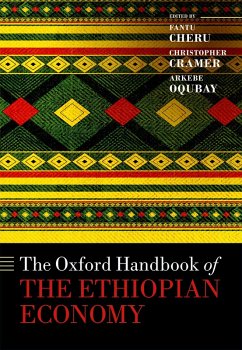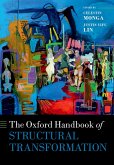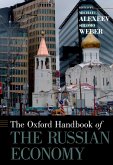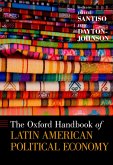The Oxford Handbook of the Ethiopian Economy (eBook, PDF)
Redaktion: Cheru, Fantu; Oqubay, Arkebe; Cramer, Christopher


Alle Infos zum eBook verschenken

The Oxford Handbook of the Ethiopian Economy (eBook, PDF)
Redaktion: Cheru, Fantu; Oqubay, Arkebe; Cramer, Christopher
- Format: PDF
- Merkliste
- Auf die Merkliste
- Bewerten Bewerten
- Teilen
- Produkt teilen
- Produkterinnerung
- Produkterinnerung

Hier können Sie sich einloggen

Bitte loggen Sie sich zunächst in Ihr Kundenkonto ein oder registrieren Sie sich bei bücher.de, um das eBook-Abo tolino select nutzen zu können.
From a war-torn and famine-plagued country at the beginning of the 1990s, Ethiopia is today emerging as one of the fastest-growing economies in Africa. Growth in Ethiopia has surpassed that of every other sub-Saharan country over the past decade and is forecast by the International Monetary Fund to exceed 8 percent over the next two years. The government has set its eyes on transforming the country into a middle-income country by 2025, and into a leading manufacturing hub in Africa. The Oxford Handbook of the Ethiopian Economy studies this country's unique model of development, where the state…mehr
- Geräte: PC
- mit Kopierschutz
- eBook Hilfe
- Größe: 6.88MB
![The Oxford Handbook of Structural Transformation (eBook, PDF) The Oxford Handbook of Structural Transformation (eBook, PDF)]() The Oxford Handbook of Structural Transformation (eBook, PDF)94,95 €
The Oxford Handbook of Structural Transformation (eBook, PDF)94,95 €![The Oxford Handbook of Public Choice, Volume 1 (eBook, PDF) The Oxford Handbook of Public Choice, Volume 1 (eBook, PDF)]() The Oxford Handbook of Public Choice, Volume 1 (eBook, PDF)98,95 €
The Oxford Handbook of Public Choice, Volume 1 (eBook, PDF)98,95 €![The Political Economy of Italy's Decline (eBook, PDF) The Political Economy of Italy's Decline (eBook, PDF)]() Andrea Lorenzo CapusselaThe Political Economy of Italy's Decline (eBook, PDF)24,95 €
Andrea Lorenzo CapusselaThe Political Economy of Italy's Decline (eBook, PDF)24,95 €![The Oxford Handbook of the Brazilian Economy (eBook, PDF) The Oxford Handbook of the Brazilian Economy (eBook, PDF)]() The Oxford Handbook of the Brazilian Economy (eBook, PDF)86,95 €
The Oxford Handbook of the Brazilian Economy (eBook, PDF)86,95 €![The Oxford Handbook of the Russian Economy (eBook, PDF) The Oxford Handbook of the Russian Economy (eBook, PDF)]() The Oxford Handbook of the Russian Economy (eBook, PDF)114,95 €
The Oxford Handbook of the Russian Economy (eBook, PDF)114,95 €![The Oxford Handbook of Latin American Political Economy (eBook, PDF) The Oxford Handbook of Latin American Political Economy (eBook, PDF)]() The Oxford Handbook of Latin American Political Economy (eBook, PDF)114,95 €
The Oxford Handbook of Latin American Political Economy (eBook, PDF)114,95 €![The Oxford Handbook of the Macroeconomics of Global Warming (eBook, PDF) The Oxford Handbook of the Macroeconomics of Global Warming (eBook, PDF)]() The Oxford Handbook of the Macroeconomics of Global Warming (eBook, PDF)94,95 €
The Oxford Handbook of the Macroeconomics of Global Warming (eBook, PDF)94,95 €-
-
-
Dieser Download kann aus rechtlichen Gründen nur mit Rechnungsadresse in A, B, BG, CY, CZ, D, DK, EW, E, FIN, F, GR, HR, H, IRL, I, LT, L, LR, M, NL, PL, P, R, S, SLO, SK ausgeliefert werden.
- Produktdetails
- Verlag: Oxford University Press
- Seitenzahl: 872
- Erscheinungstermin: 10. Januar 2019
- Englisch
- ISBN-13: 9780192546449
- Artikelnr.: 54897123
- Verlag: Oxford University Press
- Seitenzahl: 872
- Erscheinungstermin: 10. Januar 2019
- Englisch
- ISBN-13: 9780192546449
- Artikelnr.: 54897123
* 1: Fantu Cheru, Christopher Cramer, and Arkebe Oqubay: Introduction
* 2: Shiferaw Bekele: Ethiopia's transition from a traditional to a
developing economy (1890s-1960s)
* 3: Christopher Clapham: Ethiopia's political economy from the
imperial period to the present
* 4: Teferi Abate Adem: Land tenure and land policy in Ethiopia
(1950-2000)
* 5: Kidane Mengisteab: Federalism in Ethiopia's transformation
* 6: Assefa Fiseha and Fiseha Haftetsion Gebresilassie: The interface
between federalism and development in Ethiopia
* 7: Menberetsehai Tadesse and Belachew M. Fikre: Ethiopia's
constitutional framework and legal institutions for development
* 8: Fantu Cheru and Zinabu S. Rekisa: Ethiopia's 'economic diplomacy'
and regional integration
* Part II: Economic Development
* 9: Mekonnen Manyazewal and Admasu Shiferaw: Economic policy and
structural transformation in Ethiopia
* 10: Yohannes Ayalew Birru: Ethiopian financial sector development
* 11: Mekonnen Manyazewal: Financing Ethiopia's development
* 12: Seid Nuru Ali: Infrastructure and economic transformation in
Ethiopia
* 13: Ken Coutts and Christina Laskaridis: Financial balances and the
development of the Ethiopian economy
* 14: Berihu Assefa Gebrehiwot: Trade policy in Ethiopia (1991-2016)
* 15: Christopher Cramer and John Sender: Policy, political economy,
and performance in Ethiopia's coffee sector
* 16: Laura Hammond: Livelihoods and mobility in the border regions of
Ethiopia
* 17: Haileselassie A. Medhin and Alemu Mekonnen: Green and
climate-resilient transformation in Ethiopia
* 18: John Sender: Assessing poverty trends in Ethiopia (1990-2015)
* Part III: Social Policy and Development
* 19: Tassew Woldehanna and Mesele W. Araya: Poverty and inequality in
Ethiopia (1995/96-2015/16)
* 20: Abebe Shimeles: Growth, poverty, and distribution in Ethiopia
* 21: Assefa Hailemariam: Ethiopia's changing demography
* 22: Deborah Johnston and Helen Walls: Economic policy and food
security in Ethiopia
* 23: Kalle Hirvonen, Derek Headey, Jenna Golan, and John Hoddinott:
Changes in child undernutrition in Ethiopia (2000-2016)
* 24: John Hoddinott and Alemayehu Seyoum Taffesse: Social protection
in Ethiopia
* 25: Zinabu Samaro Rekiso: Education and economic development in
Ethiopia (1991-2017)
* Part IV: Agriculture and Rural Transformation
* 26: Stefan Dercon and Douglas Gollin: Agriculture's changing role in
Ethiopia's economic transformation
* 27: Alemayehu Seyoum Taffesse: The transformation of smallholder crop
production in Ethiopia (1994-2016)
* 28: Guush Berhane and Kibrom A. Abay: Rural finance and smallholder
farming in Ethiopia
* 29: Florian T. Schäfer, Tadesse Kuma Workako, and Bart Minten:
Performance and institutions of the Ethiopian coffee sector
* 30: Florian T. Schäfer: Private coffee plantations in Ethiopia
* 31: Ayelech Tiruwha Melese: Constraints on the Ethiopian Floriculture
Industry
* 32: Bart Minten, Seneshaw Tamru, and Thomas Reardon: Agricultural
markets in Ethiopia
* 33: Fantu Nisrane Bachewe and Fanaye Tadesse: Livestock production in
Ethiopia
* 34: Likimyelesh Nigussie and Annet A. Mulema: Women's empowerment in
rural Ethiopia
* Part V: Industrialization and Urban Development
* 35: Arkebe Oqubay: Industrial policy and late industrialisation in
Ethiopia
* 36: Arkebe Oqubay: Structure and performance of the Ethiopian
manufacturing sector
* 37: Admasu Shiferaw and Måns Söderbom: The Ethiopian manufacturing
sector: Productivity, export, and competitiveness
* 38: Carlos Oya: Building an industrial workforce in Ethiopia
* 39: Mulu Gebreeyesus: The private sector in Ethiopia's transformation
* 40: Lindsay Whitfield and Cornelia Staritz: Light manufacturing in
Ethiopia: The apparel export industry
* 41: Tesfachew Taffere: Technological learning and industrialisation
in Ethiopia
* 42: Won L. Kidane: The legal framework for the protection of foreign
direct investment in Ethiopia
* 43: Tadele Ferede and Belay File: Rural-urban linkages in Ethiopia
* 44: Tegegne Gebre-Egziabher and Edlam Abera Yemeru: Urbanisation and
industrial development in Ethiopia
* Part VI: Structural Transformation and the African Continent
* 45: Justin Yifu Lin, Jiajun Xu, and Sarah Hager: A New Structural
Economics perspective on Special Economic Zones in Ethiopia
* 46: Ha-Joon Chang and Jostein Hauge: The concept of a 'developmental
state' in Ethiopia
* 47: Kenichi Ohno and Izumi Ohno: A Japanese perspective on Ethiopia's
transformation
* 48: John Sutton: Institution building for industrialisation: The
Ethiopian Investment Commission
* 49: Carlos Lopes: Three sectoral policies in Ethiopia's structural
transformation
* 50: K.Y. Amoako: Growing with depth: What African countries can learn
from the Ethiopian experience
* 1: Fantu Cheru, Christopher Cramer, and Arkebe Oqubay: Introduction
* 2: Shiferaw Bekele: Ethiopia's transition from a traditional to a
developing economy (1890s-1960s)
* 3: Christopher Clapham: Ethiopia's political economy from the
imperial period to the present
* 4: Teferi Abate Adem: Land tenure and land policy in Ethiopia
(1950-2000)
* 5: Kidane Mengisteab: Federalism in Ethiopia's transformation
* 6: Assefa Fiseha and Fiseha Haftetsion Gebresilassie: The interface
between federalism and development in Ethiopia
* 7: Menberetsehai Tadesse and Belachew M. Fikre: Ethiopia's
constitutional framework and legal institutions for development
* 8: Fantu Cheru and Zinabu S. Rekisa: Ethiopia's 'economic diplomacy'
and regional integration
* Part II: Economic Development
* 9: Mekonnen Manyazewal and Admasu Shiferaw: Economic policy and
structural transformation in Ethiopia
* 10: Yohannes Ayalew Birru: Ethiopian financial sector development
* 11: Mekonnen Manyazewal: Financing Ethiopia's development
* 12: Seid Nuru Ali: Infrastructure and economic transformation in
Ethiopia
* 13: Ken Coutts and Christina Laskaridis: Financial balances and the
development of the Ethiopian economy
* 14: Berihu Assefa Gebrehiwot: Trade policy in Ethiopia (1991-2016)
* 15: Christopher Cramer and John Sender: Policy, political economy,
and performance in Ethiopia's coffee sector
* 16: Laura Hammond: Livelihoods and mobility in the border regions of
Ethiopia
* 17: Haileselassie A. Medhin and Alemu Mekonnen: Green and
climate-resilient transformation in Ethiopia
* 18: John Sender: Assessing poverty trends in Ethiopia (1990-2015)
* Part III: Social Policy and Development
* 19: Tassew Woldehanna and Mesele W. Araya: Poverty and inequality in
Ethiopia (1995/96-2015/16)
* 20: Abebe Shimeles: Growth, poverty, and distribution in Ethiopia
* 21: Assefa Hailemariam: Ethiopia's changing demography
* 22: Deborah Johnston and Helen Walls: Economic policy and food
security in Ethiopia
* 23: Kalle Hirvonen, Derek Headey, Jenna Golan, and John Hoddinott:
Changes in child undernutrition in Ethiopia (2000-2016)
* 24: John Hoddinott and Alemayehu Seyoum Taffesse: Social protection
in Ethiopia
* 25: Zinabu Samaro Rekiso: Education and economic development in
Ethiopia (1991-2017)
* Part IV: Agriculture and Rural Transformation
* 26: Stefan Dercon and Douglas Gollin: Agriculture's changing role in
Ethiopia's economic transformation
* 27: Alemayehu Seyoum Taffesse: The transformation of smallholder crop
production in Ethiopia (1994-2016)
* 28: Guush Berhane and Kibrom A. Abay: Rural finance and smallholder
farming in Ethiopia
* 29: Florian T. Schäfer, Tadesse Kuma Workako, and Bart Minten:
Performance and institutions of the Ethiopian coffee sector
* 30: Florian T. Schäfer: Private coffee plantations in Ethiopia
* 31: Ayelech Tiruwha Melese: Constraints on the Ethiopian Floriculture
Industry
* 32: Bart Minten, Seneshaw Tamru, and Thomas Reardon: Agricultural
markets in Ethiopia
* 33: Fantu Nisrane Bachewe and Fanaye Tadesse: Livestock production in
Ethiopia
* 34: Likimyelesh Nigussie and Annet A. Mulema: Women's empowerment in
rural Ethiopia
* Part V: Industrialization and Urban Development
* 35: Arkebe Oqubay: Industrial policy and late industrialisation in
Ethiopia
* 36: Arkebe Oqubay: Structure and performance of the Ethiopian
manufacturing sector
* 37: Admasu Shiferaw and Måns Söderbom: The Ethiopian manufacturing
sector: Productivity, export, and competitiveness
* 38: Carlos Oya: Building an industrial workforce in Ethiopia
* 39: Mulu Gebreeyesus: The private sector in Ethiopia's transformation
* 40: Lindsay Whitfield and Cornelia Staritz: Light manufacturing in
Ethiopia: The apparel export industry
* 41: Tesfachew Taffere: Technological learning and industrialisation
in Ethiopia
* 42: Won L. Kidane: The legal framework for the protection of foreign
direct investment in Ethiopia
* 43: Tadele Ferede and Belay File: Rural-urban linkages in Ethiopia
* 44: Tegegne Gebre-Egziabher and Edlam Abera Yemeru: Urbanisation and
industrial development in Ethiopia
* Part VI: Structural Transformation and the African Continent
* 45: Justin Yifu Lin, Jiajun Xu, and Sarah Hager: A New Structural
Economics perspective on Special Economic Zones in Ethiopia
* 46: Ha-Joon Chang and Jostein Hauge: The concept of a 'developmental
state' in Ethiopia
* 47: Kenichi Ohno and Izumi Ohno: A Japanese perspective on Ethiopia's
transformation
* 48: John Sutton: Institution building for industrialisation: The
Ethiopian Investment Commission
* 49: Carlos Lopes: Three sectoral policies in Ethiopia's structural
transformation
* 50: K.Y. Amoako: Growing with depth: What African countries can learn
from the Ethiopian experience







